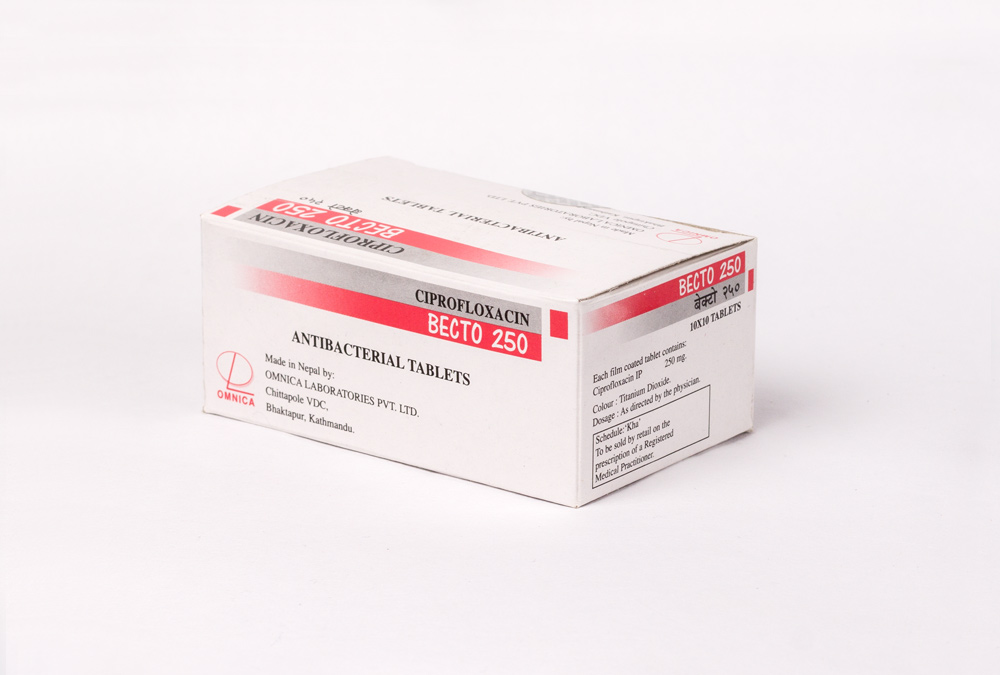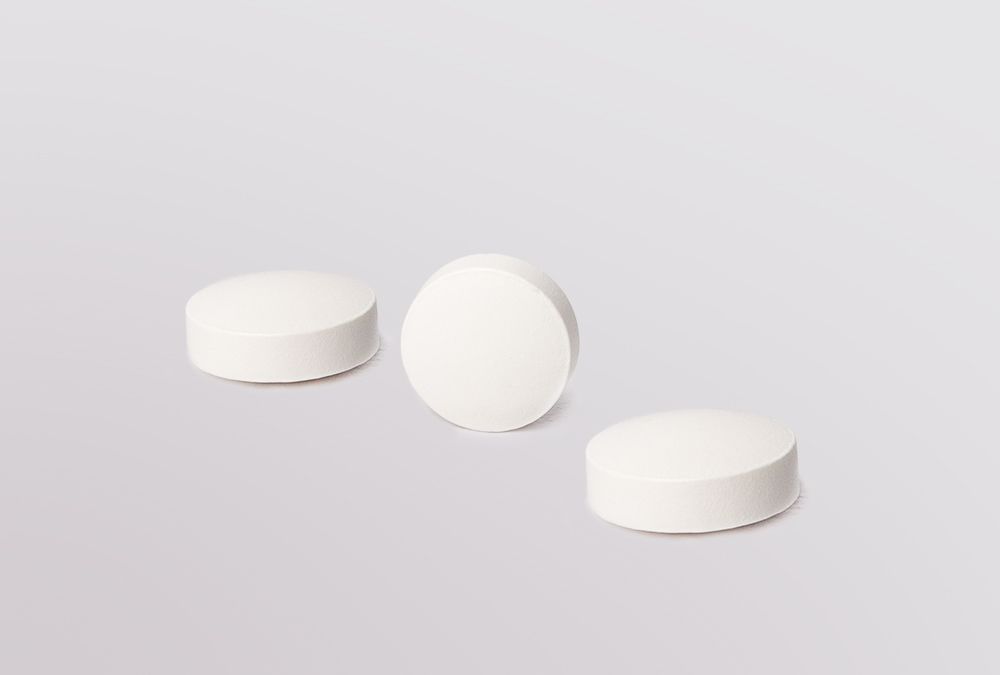Brand Name : BECTO
Generic Name : Ciprofloxacin
Preparations : 250 mg / 500 mg Tablets
Pharmacological Category : Fluoroquinolone Antibiotic
Mechanism of Action (MOA)
BECTO (Ciprofloxacin) is bactericidal and acts by inhibiting the enzymes topoisomerase II (DNA gyrase) and topoisomerase IV, which are essential for bacterial DNA replication.
Pharmacokinetics
- Absorption : Rapidly and well absorbed from the gastrointestinal tract
- Bioavailability : Approximately 70 to 80%
- Plasma Protein Binding : 20 to 40%
- Distribution : Widely distributed in the body tissues, crosses placenta, distributed into breast milk
- Metabolism : Liver; forms 4 metabolites (major : oxociprofloxacin, sulfociprofloxacin)
- Elimination Half-life : Adults : 3 to 5 hours; 8 hours (renal impairment)
- Excretion : Urine (principally); faeces (one-third)
Indications and Dosage
Adult :
- Surgical Infection Prophylaxis : BECTO 750 mg as a single dose given 60 to 90 minutes before the procedure
- Acute Uncomplicated Cystitis : One tablet of BECTO 250 mg twice daily for 3 days
- Chronic Bacterial Prostatitis : One tablet of BECTO 500 mg twice daily for a 28-day course of treatment
- Bone and Joint Infections : BECTO 500 to 750 mg twice daily for 4 to 6 weeks
- Cystic Fibrosis associated with Pseudomonas aeruginosa aged between 5 to 17 years : BECTO 20 mg per kg (to a maximum of BECTO 750 mg) twice daily
- Complicated Urinary Tract Infection or Pyelonephritis caused by E.coli : BECTO 10 to 20 mg per kg (to a maximum of BECTO 750 mg) twice daily
- Meningococcal Meningitis Prophylaxis :
Children aged 2 to 5 years : single dose of BECTO 125 mg
Children aged 5 to 12 years : single dose of BECTO 250 mg tablet
Children aged over 12 years : single dose of BECTO 500 mg tablet - Intra-Abdominal Infections : One tablet of BECTO 500 mg twice daily for 5 to 7 days in conjunction with metronidazole
- Infectious Diarrhoea : One tablet of BECTO 500 mg twice daily for 5 to 7 days
- Typhoid Fever : One tablet of BECTO 500 mg tablet twice daily for 10 days
- Lower Respiratory Tract Infections : BECTO 500 to 750 mg twice daily for 7 to 14 days
- Skin and Skin Structure Infections : BECTO 500 to 750 mg twice daily for 7 to 14 days
- Acute Bacterial Sinusitis : One tablet of BECTO 500 mg twice daily for 10 days
- Inhalational Anthrax (postexposure) : One tablet of BECTO 500 mg twice daily for 60 days
- Plague : BECTO 500 to 750 mg twice daily for 14 days
- Uncomplicated Urethral and Cervical Gonococcal Infections : One tablet of BECTO 250 mg as a single dose
Children :
BECTO 5 to 15 mg per kg (to a maximum of BECTO 500 mg) twice daily is recommended
Side Effects
MOST FREQUENT : Nausea, vomiting, diarrhoea, abdominal pain, dyspepsia, headache, dizziness, confusion, insomnia and restlessness, rash, pruritus
RARE : Gastrointestinal tract: Pseudomembranous colitis, pancreatitis, dysphagia, vasculitis, erythemamultiforme, Stevens-Johnson syndrome, toxic epidermal necrolysis, pancytopenia, haemolytic anemia or agranulocytosis
REPORTED : Tremor, drowsiness, nightmares, visual and other sensory disturbances, hallucinations, psychotic reactions, depression, convulsions, and intracranial hypertension, paraesthesia, peripheral neuropathy, photosensitivity, anaphylaxis, reversible arthralgia / myalgia, tendon damage, crystalluria, transient increases in serum creatinine or blood urea nitrogen, elevated liver enzyme values, jaundice, hepatitis, hematological disturbances including eosinophilia, leucopenia, thrombocytopenia, tachycardia, hypotension, oedema, syncope, hot flushes and sweating
Contraindications
Hypersensitivity, concurrent administration of tizanidine
Warnings / Precautions
- Caution in patients with epilepsy, CNS disorder history, renal impairment, G6PD deficiency, myasthenia gravis
- Adequate fluid intake should be maintained during treatment and excessive alkalinity of the urine avoided because of the risk of crystalluria.
- Not recommended in patients aged under 18 years, pregnant women or breast-feeding mothers unless the benefits outweigh the risks as ciprofloxacin causes degenerative changes in weight-bearing joints of young animals
- Treatment should be stopped if patients experience tendon pain, inflammation, or rupture.
- Exposure to strong sunlight or sunlamps should be avoided during treatment. The ability to drive or operate machinery may be impaired, especially when alcohol is also taken.
- Caution in patient with QT prolongation or relevant risk factors such as uncorrected electrolyte disturbances, bradycardia, or pre-existing cardiac disease
- Resistance in Methicillin-resistant Staphylococcus Aureus (MRSA) infections has been reported.
Drug Interactions
- Use of ciprofloxacin with tizanidine is contraindicated as ciprofloxacin may potentiate hypotensive and sedative effect of tizanidine.
- Theophylline may be used with ciprofloxacin providing its dose is reduced and concentration is monitored.
- Ciprofloxacin enhances the effect of oral anticoagulants such as warfarin and the oral antidiabetic glibenclamide. Severe hypoglycaemia sometimes fatal has occurred in patients also taking glibenclamide.
- Renal tubular secretion of methotrexate may be inhibited by ciprofloxacin, potentially increasing its toxicity.
- Plasma concentration of ciprofloxacin is increased by Probenecid.
- Cautions such as aluminium, calcium, magnesium or iron reduce the absorption of oral ciprofloxacin or when given together.
- Transient increase in serum creatinine has occurred when ciprofloxacin is given with ciclosporin; monitoring of serum creatinine concentrations is recommended.
- Altered serum concentrations of phenytoin have been reported in patients also receiving ciprofloxacin.
Pregnancy Category : C
Presentations
BECTO 250 mg : A box of 10 blisters, each blister of 10 tablets
BECTO 500 mg : A box of 10 blisters, each blister of 10 tablets



